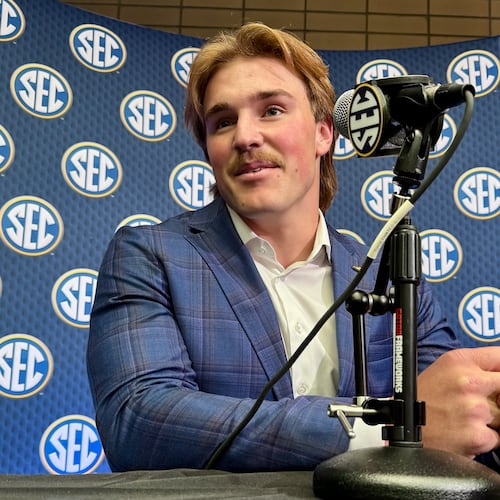In most instances of law-breaking or rule-breaking, two factors play into whether the accused is condemned to time in prison or a semester without football (at least in jurisdictions other than Tallahassee, Fla.):
1.) What did the person do?
2.) What can anybody prove?
But there’s another part of the equation in the matter of suspended Georgia running back Todd Gurley few are talking about, and it would be foolish to ignore, especially given the NCAA’s recent tendency to stick its finger in the air: Even if Gurley did break rules and even if there’s evidence to support suspending him for up to the rest of the season, would they do that?
The NCAA has been losing a public-relations battle. It also has been losing in court. The organization sometimes can't afford to be as obstinate and to-the-letter-of-the-law as it used to be because it's getting beat up so much. Hypocritical decision-making in matters regarding academics and chasing dollars have turned high-profile college athletes, some of whom not long ago were viewed as selfish and unappreciative of scholarships and campus-wide adoration, into perceived exploited and sympathetic figures.
Public opinion now favors student-athletes. Anti-trust cases and the NLRB decision on Northwestern athletes have begun to affect change. Scholarship values soon will be increased and there is a chance athletes also will some day receive a payment from their athletic department’s other sources of revenue (TV, merchandising, etc.), even if it’s a capped figure.
To reiterate, if Gurley knowingly broke rules and accepted payment for autographs, he's wrong. There's no argument against that. It would be like complaining to a judge, "I know I was going 50 mph in a 25 zone, but the speed limit there really should be 50." Rules are rules, no matter how dumb somebody believes they are.
But the NCAA must realize where public sentiment lies on this issue. There is something fundamentally wrong when an institution can profit millions off an individual, but the individual has to settle for tuition and a meal plan. It’s a standard that’s not applied to other students. (Question: If a music prodigy was attending Georgia on a scholarship and he sold CDs and autographs on weekend, would he be declared ineligible by the music department for compromising his amateur status?)
The NCAA might not want to deal with the firestorm that would accompany a Gurley season-long suspension. It would effectively end the college career of a leading Heisman Trophy candidate and obviously damage a program’s championship hopes.
And for what? Autographs?
This isn’t a case of academic fraud, sexual assault or drunken driving, all far more significant issues. This is a case of a 20-year-old who allegedly — no matter how dumb he would be for believing he could get away with it — tried to profit from his accomplishments.
Georgia coach Mark Richt has been a proponent in most issues pertaining to the rights of college athletes. But when asked Tuesday if he had an opinion on whether players should be allowed to profit on their image and likeness, he was mum. Predictable.
“I do, but I’m not going to get into all that right now,” he said. “It will obviously be tied into what we’re living through right now. If you asked me two weeks ago, I would’ve probably answered that. I’m trying to focus on trying to beat Arkansas.”
He also offered little when asked if he expected the tailback to play the rest of the season.
“I’ll answer that like I’ll answer any Gurley question: I really don’t know,” he said.
Last year, two autograph dealers claimed Johnny Manziel was paid to sign more than 4,000 items at a memorabilia show, and pictures of the former Texas A&M quarterback signing items in a hotel room even surfaced on the Internet. But investigators claimed they couldn’t find evidence Manziel was paid. A weak compromise deal was reached: Manziel was suspended for one half of the Rice game.
James Spence Authentication (JSA), the same autograph-authentication business that claims to have hundreds of Gurley-signed items for sale, also reportedly has hundreds by Florida State quarterback Jameis Winston. (The Seminoles have chosen not to suspend Winston yet.)
“I guess after what happened with Johnny Manziel, the guys think that the worst they will get is a half-game suspension,” South Carolina coach Steve Spurrier said Tuesday in Columbia. “But we all know the rules.”
Rules may soon be relaxed, and it would be naive to think the autograph issue isn’t widespread. Before a ruling is made on Gurley, the question is whether the NCAA sticks its finger in the air.
About the Author
Keep Reading
The Latest
Featured

